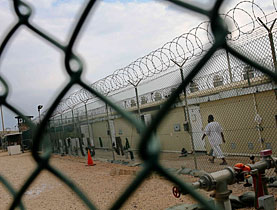
Swiss-US tensions to stay in post-Bush era

Relations between the United States and the Swiss have seen unprecedented growth under George Bush's presidency but key differences remain.
In the run up to the US presidential elections in November, nothing seems to suggest that these differences will be resolved by Bush’s successor, experts say.
At the heart of the Bush administration, in Congress or in think tanks which often develop American foreign policy, the general feeling is that relations between the US and Switzerland are closer than ever.
“We have an exceptional relationship with Switzerland,” Kurt Volker, Principal Deputy Assistant Secretary at the US Bureau of European Affairs, told swissinfo.
“The US and Switzerland are two countries that share the same values, that work together to tackle common challenges and which have numerous and varied domains of cooperation.”
Last January, at the end of a meeting with the Swiss foreign minister, Micheline Calmy-Rey, Volker’s boss Condoleezza Rice noted that relations between Switzerland the US were based on “mutual trust and a long history”.
The trust is such that Switzerland has represented US interests in Iran and Cuba for decades. The shared history dates back to the US war of independence, in which numerous Swiss fought alongside American revolutionaries.
The history is a result of the constitutional influence that these “sister republics” exercised on each other at crucial periods in the past. It continues today, notably with the creation of the Bilateral Economic Commission eight years ago.
United against terrorism
The September 11 terrorist attacks and the mobilisation of the American government in Bush’s “war on terror” led to an unprecedented strengthening of relations with Switzerland.
“Bilateral relations have developed considerably since the attacks,” says Joëlle Attinger, president of the European Institute, a think tank based in Washington.
“The evolution of relations since 2001 has been positive from the American point of view. The US appreciates Switzerland’s role as a neutral representative that has been able to interact positively with America on dossiers of primary importance for Washington, such as Iran.”
Five years after the terrorist attacks, the US and Switzerland signed three agreements which state what Rice calls their “intensified cooperation” in the political, police-related and judicial fields, as well as commercial and economic.
“Our two countries took a step forward in 2006 towards creating a more structured relationship,” Volker explains.
“The US already had solid relations with Nato and the European Union and we therefore needed to reinforce our connection to Switzerland.”
Tensions
Even if the Americans are full of praise for Switzerland’s aid in the fight against funding terrorism, relations between the sister republics are, as before 2001, subject to tensions.
At the end of the 1990s there was a fall-out over the Holocaust-era dormant accounts in Switzerland. There is also the US treatment of terrorism suspects, from Guantánamo to the CIA’s secret prisons.
“There is a gap over human rights between Washington and Switzerland, which takes a very clear stand as guardian of the Geneva Conventions [on international humanitarian law] and reflects the global conscience,” Attinger said.
Bush’s successor will inherit these tensions but it is not certain whether he will be able or will want to resolve them.
“If it is John McCain, the margin for change will be more limited than if it is Barack Obama, for whom the approach for problems preoccupying the US and Switzerland would be more multilateral. But one must be careful and not expect too much from Obama,” she added.
“The role of Congress should not be underestimated. A President Obama would have to govern with a Congress that would be difficult to manage, even if the Democrats reinforce their majority. Because their party houses a big diversity of opinion.”
swissinfo, Marie-Christine Bonzom in Washington
Switzerland and the US have a shared history of democratic values.
The US Articles of Confederation were modelled after the former Swiss alliance of 13 sovereign states. In revising the Declaration of Independence with Britain in 1776, Thomas Jefferson and other founding fathers of the US took their inspiration notably from Swiss scholars such as Geneva’s Jean-Jacques Burlamaqui, a theorist in natural law.
In 1848 the authors of the Swiss federal constitution in turn used the American constitution as a model for bicameralism and federalism.
The US established diplomatic ties with Switzerland in 1853 and Switzerland returned the move in 1868.
Washington and Bern strengthened their links after the trauma caused by the fall-out in the 1990s over the Holocaust-era dormant accounts in Switzerland.
A joint economic commission was created in 2000 during the annual meeting of World Economic Forum in Davos to foster bilateral ties.
In 2006, the Bush administration and the Swiss government followed this strategy of rapprochement by signing three agreements: firstly, political, secondly, for police-related and judicial cooperation with a main goal of addressing terrorism, and thirdly, economic and commercial.

In compliance with the JTI standards
More: SWI swissinfo.ch certified by the Journalism Trust Initiative


























You can find an overview of ongoing debates with our journalists here . Please join us!
If you want to start a conversation about a topic raised in this article or want to report factual errors, email us at english@swissinfo.ch.